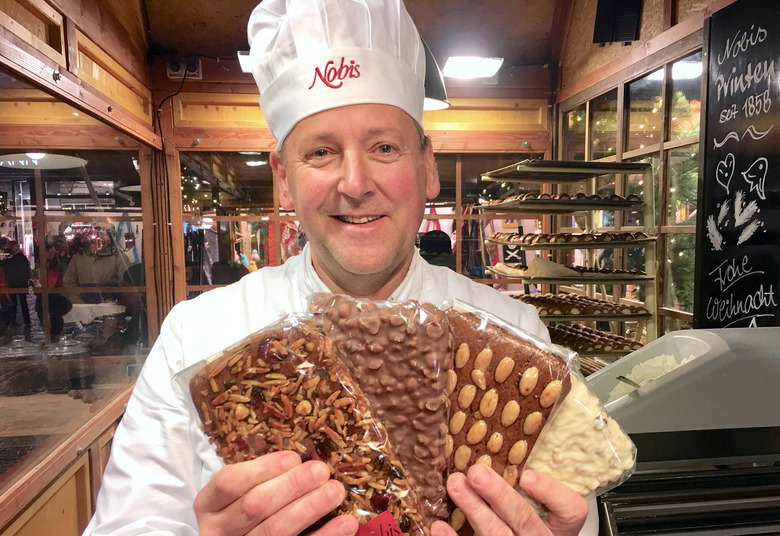Germany In The Winter Isn't Just Christmas Markets
Christmas markets are a delightful annual tradition in Germany. Each one is a sparkling fairyland with Christmas music, bright colorful lights, and crowds of people all bundled up in winter clothes. Out for an evening of fun, everyone is busy chatting, laughing, and enjoying warm, spiced wine to wash away the chilly air.
The festivities begin several weeks prior to Christmas Day when temporary wooden huts are constructed and placed in the market squares of towns. Some towns and villages have as many as 200 huts, and each hut is festooned with Christmas bulbs, wreaths, and ribbons as well as Santa and his elves.
Vendors sell a variety of handicrafts such as candles, ornaments, carved wooden toys, and wind chimes, and the aroma of the Christmas market foods fills the surrounding streets even before one enters the festival grounds. Some of the edible goodies you might enjoy include bratwurst, potato pancakes, spiced wine, pastries, and beer.
A recent trip to Germany took us to the Christmas markets in the historic cities of Lübeck, Bonn, Aachen, and Wiesbaden, but each city had plenty to offer outside the festive markets.
Lübeck's markets were a pure delight, and they had several, including a dimly lit medieval section featuring Old World crafts and food. This city is proud of its three Nobel Prize Laureates: Thomas Mann, Willy Brent, and Günter Grass — all of whom considered Lübeck their hometown.
Buddenbrookhaus honors the literary achievements of Mann and attracts his followers and devotees from all over the world. The Günter Grass-Haus contains the author's writing studio, now an exhibition and research facility. Nearby, the Willy-Brandt-Haus features interesting exhibits and displays from the different eras of the life of this late politician and federal chancellor.
Lübeck is known for delicious high-quality marzipan created in 300 varieties. Russian czars and German emperors have enjoyed this delicacy and Café Niederegger is the place to go for this chewy confection. Operating since 1806, the café attracts visitors from all over the world.
If you want to walk off Christmas market calories, take a tour of the Lübeck Cathedral. This religious shrine was completed around 1230 and contains numerous works of interesting art and historical importance.
In Bonn, we visited a wonderful Christmas market filled with sparkling lights, decorated trees, and the aroma of street food. Bonn's famous son, Beethoven, was born in December 1770, and the city is already gearing up 2020 when many celebrations will commemorate the 250th anniversary of his birth.
The Museum Mile contains – you guessed it – several museums for art and cultural aficionados. One interesting exhibit is a contemporary history of Germany since 1945 at the Haus der Geschichte der Bundesrepublik Deutschland. On the nearby Rhine River, a romantic boat trip meandering through the city is also available.
Aachen's Christmas market is cheerfully abuzz with holiday activity. We strolled through the aisles of vendors and partook of more grilled bratwurst and potato pancakes served with a side of chunky applesauce. It was fun to see the children bundled up from head to toe like little colorful snowmen and enjoying the carnival rides blaring with loud holiday music throughout the grounds.
Charlemagne established his imperial residence Aachen and coronations took place in the city's cathedral up until the 16th century. There are 5,000 years of history to explore as well as the city's art and historical museums. The newest attraction is the Centre Charlemagne, a museum that brings Aachen's history alive.
Aachener Printen is the most famous delicacy of the city. This pastry is a spicy gingerbread and has been produced in the region since 1820. For four generations, the Nobis family has operated several in-town shops as well as a popular Christmas stall where people line up to purchase colorfully wrapped packages of the confection.
Wiesbaden, our last stop, had the beautifully-lit pink Marktkirche (market church) majestically residing over the Christmas market where a variety of Christmas concerts and special programs for children are offered. Adults can enjoy one of the most popular beverages, glühwein, a hot, spiced drink made with red or white wine from the region's various vineyards.
Wiesbaden is known for hot thermal springs, discovered by the Romans 2,000 years ago. Today, visitors from all over the world arrive here to enjoy the healing baths, and if there is spare time, architectural and cultural tours are available.
The unique Christmas markets as well as the rich cultural heritages of these four German cities provide visitors with a delightful experience. The food, crafts, architecture, and fascinating histories of Lübeck, Bonn, Aachen, and Wiesbaden will have you booking your trip for next year's celebrations.
FTC Disclosure: This was a sponsored visit, however, all opinions herein are the author's.
Find other markets around the world.
